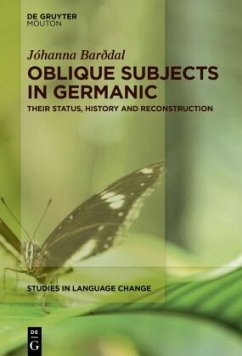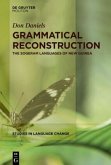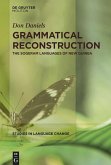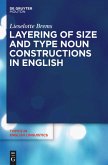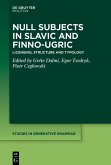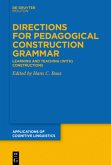Pulling together the threads of forty years of research on oblique subjects in the Germanic languages, this book introduces a novel approach to grammatical relations, based on a definition of subject as the first argument of the argument structure. New data are presented from Gothic, Old Saxon, Old Norse-Icelandic, Old Swedish and Old Danish, as well as from Icelandic, Faroese and German. This includes alternating Dat-Nom/Nom-Dat predicates, where either argument, the dative or the nominative, takes on subject behavior. The subject concept is modeled with the formalism of Construction Grammar, both synchronically and for the purpose of reconstructing grammatical relations for Proto-Germanic.
Hinweis: Dieser Artikel kann nur an eine deutsche Lieferadresse ausgeliefert werden.
Hinweis: Dieser Artikel kann nur an eine deutsche Lieferadresse ausgeliefert werden.
"Jóhanna Barðdal has done it again. In this book, she takes on a topic one might think has been fully explored - subjecthood in Germanic languages - and discovers that, unexpectedly, the pattern of Dat-Nom/Nom-Dat alternating predicates is widespread throughout the Indo-European languages. In elucidating this pattern, she refines a theoretical approach to subject and she makes a compelling case for reconstructing alternating predicates (at least) to Proto-Germanic."
Spike Gildea, University of Oregon
"In this monograph, a landmark in research on syntactic reconstruction and oblique subjects, Jóhanna Barðdal presents an impressive array of new data and arguments, demonstrating beyond reasonable doubt that oblique subjects can be found in older stages of all Germanic languages and hence must be considered to have been a feature of Proto-Germanic. She convincingly argues that syntactic reconstruction is not only theoretically possible but also empirically feasible. Furthermore, she shows that contrary to common belief, Modern German also has oblique subjects, in addition to Icelandic and Faroese where their existence has long been recognized."
Eiríkur Rögnvaldsson, University of Iceland
Spike Gildea, University of Oregon
"In this monograph, a landmark in research on syntactic reconstruction and oblique subjects, Jóhanna Barðdal presents an impressive array of new data and arguments, demonstrating beyond reasonable doubt that oblique subjects can be found in older stages of all Germanic languages and hence must be considered to have been a feature of Proto-Germanic. She convincingly argues that syntactic reconstruction is not only theoretically possible but also empirically feasible. Furthermore, she shows that contrary to common belief, Modern German also has oblique subjects, in addition to Icelandic and Faroese where their existence has long been recognized."
Eiríkur Rögnvaldsson, University of Iceland

